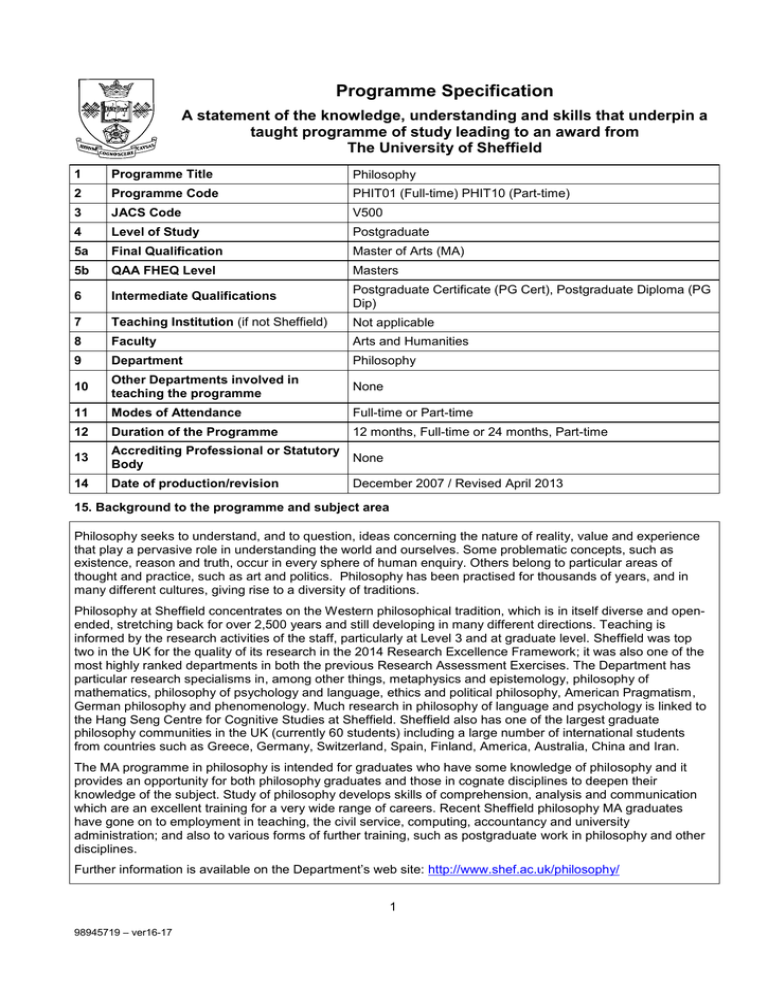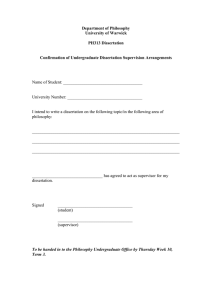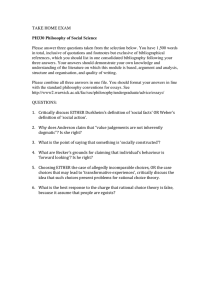Programme Specification
advertisement

Programme Specification A statement of the knowledge, understanding and skills that underpin a taught programme of study leading to an award from The University of Sheffield 1 Programme Title Philosophy 2 Programme Code PHIT01 (Full-time) PHIT10 (Part-time) 3 JACS Code V500 4 Level of Study Postgraduate 5a Final Qualification Master of Arts (MA) 5b QAA FHEQ Level Masters 6 Intermediate Qualifications Postgraduate Certificate (PG Cert), Postgraduate Diploma (PG Dip) 7 Teaching Institution (if not Sheffield) Not applicable 8 Faculty Arts and Humanities 9 Department Philosophy 10 Other Departments involved in teaching the programme None 11 Modes of Attendance Full-time or Part-time 12 Duration of the Programme 12 months, Full-time or 24 months, Part-time 13 Accrediting Professional or Statutory Body None 14 Date of production/revision December 2007 / Revised April 2013 15. Background to the programme and subject area Philosophy seeks to understand, and to question, ideas concerning the nature of reality, value and experience that play a pervasive role in understanding the world and ourselves. Some problematic concepts, such as existence, reason and truth, occur in every sphere of human enquiry. Others belong to particular areas of thought and practice, such as art and politics. Philosophy has been practised for thousands of years, and in many different cultures, giving rise to a diversity of traditions. Philosophy at Sheffield concentrates on the Western philosophical tradition, which is in itself diverse and openended, stretching back for over 2,500 years and still developing in many different directions. Teaching is informed by the research activities of the staff, particularly at Level 3 and at graduate level. Sheffield was top two in the UK for the quality of its research in the 2014 Research Excellence Framework; it was also one of the most highly ranked departments in both the previous Research Assessment Exercises. The Department has particular research specialisms in, among other things, metaphysics and epistemology, philosophy of mathematics, philosophy of psychology and language, ethics and political philosophy, American Pragmatism, German philosophy and phenomenology. Much research in philosophy of language and psychology is linked to the Hang Seng Centre for Cognitive Studies at Sheffield. Sheffield also has one of the largest graduate philosophy communities in the UK (currently 60 students) including a large number of international students from countries such as Greece, Germany, Switzerland, Spain, Finland, America, Australia, China and Iran. The MA programme in philosophy is intended for graduates who have some knowledge of philosophy and it provides an opportunity for both philosophy graduates and those in cognate disciplines to deepen their knowledge of the subject. Study of philosophy develops skills of comprehension, analysis and communication which are an excellent training for a very wide range of careers. Recent Sheffield philosophy MA graduates have gone on to employment in teaching, the civil service, computing, accountancy and university administration; and also to various forms of further training, such as postgraduate work in philosophy and other disciplines. Further information is available on the Department’s web site: http://www.shef.ac.uk/philosophy/ 1 98945719 – ver16-17 16. Programme aims 1. Equip students with an understanding of a range of philosophers and philosophical problems, while encouraging as deep a critical engagement with those philosophers and problems as is feasible in the time available. 2. Promote respect for the norms of – clarity; careful analysis; critical reflection; rational argument; sympathetic interpretation and understanding; and impartial pursuit of truth. 3. Promote independence of thought and a critical and analytical approach, not only to theories and concepts, but to the assumptions on which they are based. 4. Equip students with the core skills involved in – careful reading, comprehension and compression of textual material; clear thinking; sound argumentation; and the clear and well-organised expression of ideas. 5. Provide high quality teaching and undergraduate and postgraduate levels which is informed and invigorated by the research activities of members of staff. 6. Facilitate an awareness of the application of philosophical thought to other academic disciplines or to matters of public interest, encouraging students to apply philosophical skills more widely where appropriate. 7. Encourage students to plan for themselves the contents of their degree programmes in philosophy, and to plan and organise their own work, within the constraints and advice provided by the Department. 8. Recruit highly qualified students, while at the same time providing access for those with non-standard qualifications who can benefit successfully from the postgraduate programme. 17. Programme learning outcomes Knowledge and understanding - By the end of the programme, students will have developed: K1 An understanding of fundamental terms and concepts essential to the discipline of philosophical investigation. K2 An understanding of and critical awareness of a range of current philosophical problems, much of which is at, or informed by, work at the forefront of philosophical inquiry. K3 An understanding of techniques applicable to their own research or advanced scholarship. K4 Originality in the application of knowledge, together with a practical understanding of how established techniques of philosophical research are used to acquire knowledge in the discipline. K5 An understanding of a number of areas of philosophy which will benefit both those without much previous background in philosophy and those with such a background. K6 Students who complete an MA dissertation will have displayed a deeper knowledge of the literature on a particular topic and will have arrived at a view of it which shows an awareness of the major positions in the area and is defended in detail. Skills and other attributes: Intellectual Skills A1 Ability to read carefully and interpret philosophical texts, and to identify textually-based arguments. A2 Ability to recognise the strengths and weaknesses of arguments for and against a philosophical position. A3 Ability not only to assess critically both their own thinking and the work of other philosophers, but also to make out their own positive case for their views. A4 To have had the opportunity to take modules introducing them to some major figures from the history of philosophical thought, and which encourage careful reading, sympathetic exegesis, and critical engagement with their works. A5 Students who complete an MA dissertation will have the ability to produce a sustained piece of research focused on a specific topic and to defend it in discussion with a well informed critic. 2 98945719 – ver16-17 Skills and other attributes: Generic Transferable Skills B1 Ability to communicate ideas and arguments effectively both orally and in writing to both specialist and non-specialist audiences. B2 Ability to manage time effectively by working to deadlines. B3 Ability to work independently to research and produce substantial pieces of writing to specified standards of content and presentation. B4 Ability to use libraries and IT resources effectively for the purposes of searching for and acquiring relevant information. B5 The independent learning ability required for continued professional development. 18. Teaching, learning and assessment Development of the learning outcomes is promoted through the following teaching and learning methods: K1- K5: Knowledge and Understanding Induction procedures including the issuing of a comprehensive departmental graduate booklet dealing with modules and administrative issues, a general welcome meeting with the Director of Graduate Studies and later individual meetings with the Director of Graduate Studies and with MA supervisors to aid module choice. Lectures provide introductory guidance to particular bodies of academic material and to philosophical terminology, and offer guidance on how that material is to be understood, used and evaluated. Lectures are clearly linked to follow-up seminars. Having attended a lecture on a topic, students are then well equipped to do more analytical work both in private study and in small-group discussions. Seminars enable students to work through pieces of text or problems in detail, thereby developing their understanding of philosophical texts and problems. Seminars are associated with each module and separate seminars for MA students and other graduates are provided where the graduate students taking a given module number at least four. Private Study in preparation for lectures, seminars and assessment develops students’ understanding of texts and problems, and increases their knowledge base. The amount of independent study broadly expected for each module is clearly set out in the graduate information booklet, although it is recognised that this will vary from student to student. A1 - A5: Intellectual Skills Induction procedures such as the departmental booklets and advice from Director of Graduate Studies and supervisors are designed to help students engage with their chosen modules in a critical and analytical way and produce written work which is lucid, well informed and well structured. Discussion both in lectures and, to a greater extent, in seminars facilitates the student’s reading and analysis of philosophical texts and encourages them to develop their own lines of thought against a rigorous background provided by lectures and by private study of assigned reading. The one-to-one advisory essay tutorials which are part of each MA module enable lecturers and students to work together on a particular piece of student work, improving it and giving the student the opportunity to elaborate and defend their views in detailed discussion. The lecturer reads a draft of this essay prior to the meeting and provides detailed comments on it during the session. Each MA student is assigned a supervisor for their MA dissertation with whom they discuss plans and drafts of the dissertation. This gives the student an opportunity to explore issues at the forefront of the discipline with an expert on a one-to-one basis and thereby to develop their understanding and their ability to make original applications of their knowledge. The student is also encouraged to approach their supervisor for advice on their module essays. B1 - B6: Generic Transferable Skills The induction procedures provide information about essay writing skills aimed at all including those from non-UK backgrounds. Students strengthen their reading and understanding skills through preparation for seminars, advisory tutorials and coursework essays. 3 98945719 – ver16-17 Seminars and one-to-one advisory tutorials enable students to strengthen their capacities to question and evaluate the material being studied and to formulate opinions. They also develop oral communication skills, both through the medium of discussion and where students are asked to give presentations in seminars. A library induction session and the University’s IT induction sessions introduce students to essential learning skills. Throughout the programme, students have the opportunity to acquire and enhance the ability to use IT and library skills for the purposes of acquiring, presenting and communicating relevant information. MA students will gain further experience of working independently on a substantial research project in the course of writing an MA dissertation. Opportunities to demonstrate achievement of the learning outcomes are provided through the following assessment methods: K1 - K5: Knowledge and Understanding A coursework essay is associated with each of the four modules an MA student must register for. These essays give students the opportunity to work on foundational texts and/or on issues at the forefront of the discipline and to display their grasp of these texts and issues. The student must write either one longer essay or two shorter essays for each module. Formative feedback (i.e. feedback intended to improve the essay) either oral or written is given in the context of a one-on-one advisory essay tutorial with the lecturer. Written feedback, both formative and summative (i.e. feedback intended to evaluate the essay) is given by the lecturer (and a second marker) on the final submission. The MA dissertation provides the student with an opportunity to display a deeper knowledge of a particular area of the subject. The lecturer gives advice on the gestation and drafting of MA dissertations in at least two one-to-one meetings and then provides feedback, both summative and formative, on the final submission. A1 – A5: Intellectual Skills Coursework essays and the MA dissertation assess these skills. Work on the coursework essays gives the student the opportunity to hone their analytical skills and acquire the depth of knowledge needed in an MA dissertation. Feedback, both summative and formative, is provided on essays, on seminar presentations and in advisory tutorials. B1 – B6: Generic Transferable Skills Skills of self-motivation, organisation and self-discipline are tested by coursework essays and by the MA dissertation. These modes of assessment also constitute an indirect test of a student’s ability to use library resources and IT. Feedback on essays will comment on the student’s written communication skills. Although student presentations are not explicitly assessed, informal feedback is provided. 19. Reference points The learning outcomes have been developed to reflect the following points of reference: The research interests of departmental staff and the research strategy of the Department of Philosophy; The Mission Statement of the University of Sheffield, as presented in its Corporate Plan; The Learning and Teaching Strategy of the University of Sheffield; The Masters level qualification descriptor contained in the QAA Framework for Higher Education Qualifications in England, Wales and Northern Ireland. 20. Programme structure and regulations Full time MA students take four 30-credit modules in the course of their MA year, normally two in each semester, thus ensuring a balanced workload throughout the year. There is a wide range of modules, and they can choose any combination of those. In the Spring, they begin work on their 60-credit MA dissertation and the period between the end of the Spring Semester and the end of the period of registration is devoted entirely to the dissertation. Part Time MA students take three 30-credit modules in their first year (two in one semester, one in the other), with a further module taken whilst the 60-credit dissertation is written in the second year. In many modules, graduate students are taught alongside final-year (Honours level) undergraduates. However, 4 98945719 – ver16-17 these modules are ‘enhanced’ for graduate students principally by the use of modes of assessment which address the learning outcomes specific to this degree programme, requiring more intensive and extensive study, and a greater degree of independent research. Where numbers make it appropriate (3 or more graduates on the module) separate seminars for graduate students are also arranged. Other modules are for MA students only and taught through research seminars. And students can take a “PhD Proposal” module in Spring if they are hoping to go on to the PhD after their MA. Detailed information about the structure of programmes, regulations concerning assessment and progression and descriptions of individual modules are published in the University Calendar available on-line at http://www.shef.ac.uk/govern/calendar/regs.html. 21. Student development over the course of study The MA student is first required to take four modules and to write essays for each of them. Unlike at undergraduate level, the MA student chooses the topic of these essays in consultation with the lecturer. . The required length of the essays (either two 2-3,000 word essays or more usually one 4-6,000 word essay) ensures that these topics are treated at greater depth than would be possible at undergraduate level. This is also true of the Postgraduate Diploma and Postgraduate Certificate (candidates who pass coursework essays for 4 modules can be awarded a Postgraduate Diploma in Philosophy without submitting a dissertation, while those who pass coursework essays for two modules can be awarded a postgraduate certificate). The MA student is asked to write a dissertation of 9,000-12,000 words, requiring them to focus on a narrower range of issues to be considered in detail. The student is able to try out various ideas and topic areas in their coursework essays before settling on their dissertation topic. Drafts of the dissertation are subject to the same critical scrutiny as the coursework essays and students are thereby given the opportunity to benefit from the sort of critical engagement which the MA coursework has prepared them for. This dissertation is a distinctive feature of a postgraduate programme and is a good test of the student’s aptitude for further research in the subject. 22. Criteria for admission to the programme Detailed information regarding admission to the programme is available at http://www.shef.ac.uk/prospective/ 23. Additional information For further information students are directed to the Department web pages at: http://www.shef.ac.uk/philosophy These contain full information on modules and provide access to student handbooks. This specification represents a concise statement about the main features of the programme and should be considered alongside other sources of information provided by the teaching department(s) and the University. In addition to programme specific information, further information about studying at The University of Sheffield can be accessed via our Student Services web site at http://www.shef.ac.uk/ssid 5 98945719 – ver16-17



